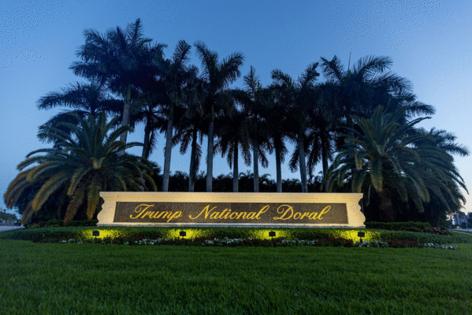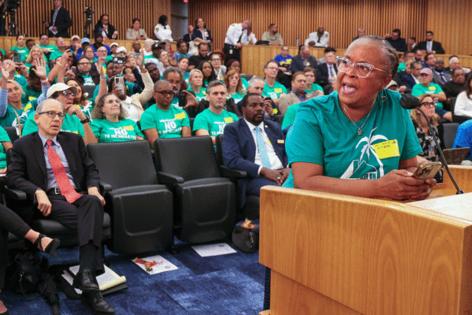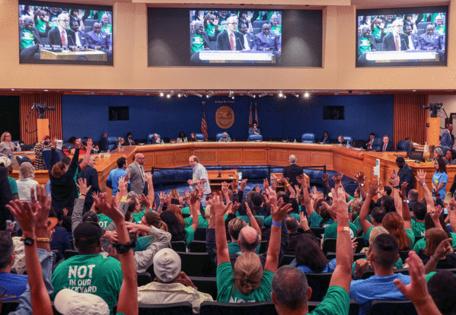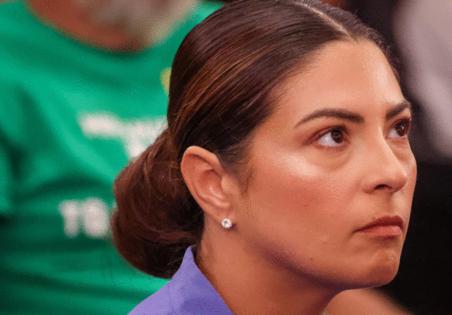Doral, Florida, vows action against county on incinerator, may try to recruit Trump to its cause
Published in News & Features
MIAMI — On the heels of a recommendation by Miami-Dade’s mayor to keep a controversial waste incinerator in Doral, city officials have vowed to fight it, including perhaps attempting to recruit to their cause President-elect Donald Trump, who owns a major resort within city limits.
On Friday, Miami-Dade Mayor Daniella Levine Cava reversed her stance on relocating the incinerator two months after initially recommending that the county move it out of Doral. In a memo, she said that sites outside Doral are too expensive and would result in significant rate increases for the 350,000 homes that rely on Miami-Dade’s Solid Waste Department for garbage collection. Alternatively, relocating the facility would place too much of a financial burden on Doral taxpayers to cover the costs.
After a fire damaged the incinerator in 2023, the county and the city have worked on finding a solution that includes relocating a new, modern incinerator away from Doral. Health concerns arose in the city due after days of smoke that affected the surrounding areas before the fire was put out.
The county commission plans to vote on a new incinerator site on Dec. 3. Some commissioners have already said in prior meetings that the current site is the most economically viable, while urging Doral to cover the additional relocation costs, estimated at $800 million, if the facility is moved outside city limits. The proposed alternatives are expected to cost $1.5 billion.
The city of Doral has been preparing for an unfavorable vote from the Miami-Dade County Commission since September, when discussions about a legal dispute to delay or prevent the incinerator’s construction within city limits began.
On Nov. 4, just two days before the county was initially scheduled to vote on the incinerator location, the city council unanimously authorized the city attorney to begin a conflict resolution dispute forcing the county to negotiate an agreement if the commission decides to build a new incinerator in Doral.
That would mean invoking a state statute that would require both administrations to meet with a mediator within 30 days, followed by a joint session of the city council and the county commission 60 days later. If the negotiations fail, the city has said it is prepared to sue the county.
Lorenzo Cobiella, Doral’s city attorney, told the Miami Herald that while the city has not yet filed the dispute, it expects to do so if the county votes to build the incinerator in Doral. “There isn’t a conflict yet,” Cobiella said. “We will take any necessary action to ensure that Doral’s residents are protected from the waste plant.”
Seeking Trump’s support
Doral Mayor Christi Fraga vowed to fight against the facility’s construction in Doral with every means at her disposal. She said she plans to reach out to the U.S. Environmental Protection Agency and Trump’s nominee for EPA admistrator, Lee Zeldin, to seek their support in preventing the county from obtaining the necessary permits to build the new facility within city limits.
Fraga believes Trump will help the city’s residents, given that Trump National Doral Golf Club is located just one mile from the Miami-Dade incinerator on Northwest 97th Avenue. Additionally, the Trump Organization has a proposed development for a 1,429-unit condo complex and 141,000 square feet of retail space on the resort’s southeastern corner, which is currently pending final city approval.
A week ago, Trump endorsed city council candidate Nicole Reinoso, who is part of Fraga’s slate, and if elected, she could play a key role in the approval of his development project in the city.
“The county is asking for double taxing Doral’s residents. They want us to pay for the relocation, while we pay as any other residents of the county for the construction of the new site,” Fraga said. “This should be illegal, and probably is.”
What is Doral willing to pay?
In its November meeting, the Doral city council agreed to increase its offer to the county to $40 million over 30 to 35 years, contingent on the relocation of the waste-to-energy facility away from Doral. That was a significant increase from the initial $20 million proposal, but it is still a long way from the $800 million that Miami-Dade is requesting.
Fraga told the Herald that the city could even contribute more than the originally approved $40 million — potentially as much as $200 million over 40 or 50 years — to help pay for the relocation, using a portion of the increased tax revenue from property values within a one-mile radius of the incinerator. However, she emphasized that the city cannot cover the $800 million relocation cost.
“We will go bankruptcy, or we will have to give the city away to the county,” Fraga said. “There’s no way we could pay for the relocation.”
After Levine Cava’s recommendation, Doral officials are taking steps to prevent what they see as an inevitable outcome.
Councilwoman Digna Cabral has requested an emergency meeting, though no date has been set yet. The next council meeting is scheduled for Dec. 18. “This matter requires immediate attention to ensure the well-being of our residents and the future of our community,” Cabral said in a public statement.
Cobiella said that Cabral’s request was a strategic move to prepare for the possibility of a vote against Doral’s interests.
On Dec. 10, Doral will hold a runoff election for Seat 3, between Reinoso and Juan Carlos Esquivel.
Esquivel, a long-time resident and advocate for relocating the waste facility, said in a statement that he is disappointed with the lack of decisive action taken to protect the Doral community from the “harmful project.’ “For over two and a half years, our municipal government has done little to prevent this from becoming a reality,” he said.
Councilman Rafael Pinyero called Levine Cava’s memo “disappointing.” He said if the county chooses to keep the facility in Doral, it would be an “easy political decision,” but won’t address the issue long-term. “They aren’t thinking about the county’s future,” Pinyero said.”
Doral Councilwoman Maureen Porras said the city needs to review environmental studies and the work done by Doral’s lobbyists, and may consider hiring a different group of lobbyists or changing its strategy. While she believes the legal dispute could delay the county’s actions, she remains uncertain about its chances. “We’ve done everything in our capacity to try and relocate the incinerator. This issue has united the council,” she said.
Cabral, Porras, and Pinyero told the Herald that they were unaware of the information Fraga provided regarding the potential increase in Doral’s contribution as leverage in negotiations with Miami-Dade.
Cabral told Herald that one of the reasons she is requesting an emergency meeting it is “to ensure that all relevant information is discussed transparently and collaboratively.”
However, Pinyero noted that Miami-Dade has estimated that property values within one mile of the incinerator could increase by 10%. He said he would support any proposal to prevent the incinerator from remaining within city limits.
The city is urging residents to attend the Miami-Dade County Commission meeting on Dec. 3 and will be providing two buses for transportation from the Doral Government Center.
©2024 Miami Herald. Visit at miamiherald.com. Distributed by Tribune Content Agency, LLC.














Comments